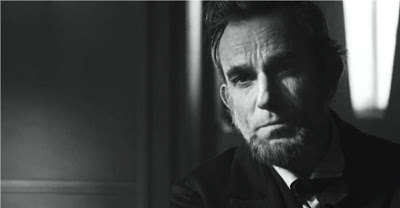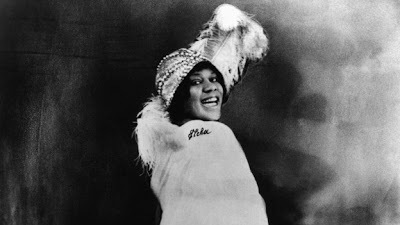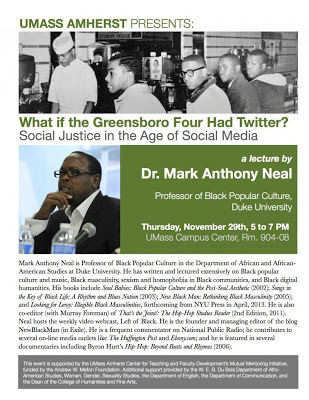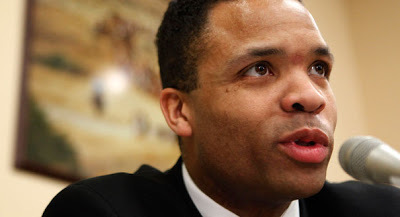Mark Anthony Neal's Blog, page 937
November 30, 2012
‘King Abraham Africanus’?: Lincoln Review

‘King Abraham Africanus’?: Lincoln Review by Stephane Dunn | special to NewBlackMan (in Exile)
When I was in college, one of those too rare truly provocative discussions occurred over an assigned reading about the nineteenth century in America. I don’t remember the reading, but I do remember that it led to some discussion of President Abraham Lincoln. Lincoln was discussed unquestionably as the ‘Great Emancipator.’ I dared to contradict, having not too long before read some books that gave me a history lesson I hadn’t gotten in all of my middle or high school years. I suggested that the Emancipation was less about a racially progressive Lincoln and more about saving the country and that Lincoln was no great supporter of racial equality or black folk generally. It got heated in the classroom. A girl actually cried she was so disturbed by what she saw as my blasphemy against noble Lincoln. I felt badly and was disturbed as well as further fascinated by the enigma that I think Lincoln remains. The classroom incident heightened my consciousness of Lincoln’s tall complicated, controversial historical shadow.
Steven Spielberg’s sojourn into representing Lincoln in the new movie of the same name automatically provokes major questions: Would he complicate the imagery of Lincoln or would he merely represent the mythology of the noble ‘Great Emancipator’ draped in the spectacle of some arresting Civil War battle scenes? Would race and slavery be merely backdrop? Movies set within the Civil War don’t even necessarily guarantee that black folk will figure in or even appear save as a sort of décor to authenticate the southern setting of the times. To Spielberg’s credit, he does go there setting his film around the controversial House battle to secure the passage of the 13th amendment in January of 1865 though save for the opening scene, the voice of black folk really are eerily too muted even probably the most publicly prominent black figure agitating at the time, one Frederick Douglas.
This is not to say that Lincoln isn’t worth watching; it deserves some applause for several achievements—resisting merely draping a critical narrative of Civil War history in the spectacle of too many graphic battle scenes and instead concentrating on the plodding, pivotal politicking that of course was a part of the beginning and end of the Civil War for one and for another the physical incarnation of Lincoln in Daniel Day Lewis’s understated, nuanced Lincoln impersonation in masterful make up and costuming. The very physical portraiture of Lincoln—the thin, tall frame and of course that craggy, unforgettable face framed by that signature black top hat are a part of Lincoln’s enigmatic aura.
The silhouettes of Lincoln and the profile shots are striking. Lewis manages to convey a sense of what had to be the bodily trauma caused from having the responsibility of literally preserving the country’s unity sitting on those seemingly frail shoulders. While the portrait of Mrs. Lincoln played by veteran actress Sally Field wavers uncomfortably, if interestingly, between white southern lady stereotype and steel matriarch, Lewis’s performance, aided by some expert Spielberg positioning, pulls off that mysteriousness of Lincoln, that deceptively accessible, common man yet solitary persona that has never been able to be encapsulated by the well-known bio of the naïve country boy turned wily lawyer then unlikely president and preserver of the union. We get a glimpse of the savvy diplomat and political maneuverer whom his political allies and rivals sometimes underestimated and at points came to respect. Tommy Lee Jones as anti-slavery and anti-racism crusader Thaddeus Stevens provides a dash of comic relief and the vociferous House scenes remind us that Washington party politics have rarely placed nicely together. The direction of Lincoln also reminds us that for all of his achievements with the spectacular technology that accompany his and many contemporary blockbusters, Spielberg is truly, as a movie buddy of mine put it, a traditionalist at heart when it comes to filmmaking and a storyteller whose intrigued more than anything by compelling stories.
The story that his Lincoln takes on us invites scrutiny about historical accuracy and about how he handles the controversial historical representation of ‘honest Abe’ and the ‘Great Emancipator’ versus Lincoln the politician and white man who shared the same racist views and belief in white supremacy as many of his peers and whose motivation with the Emancipation—(which only freed slaves in the seceded states if they didn’t cease their resistance by the deadline) was the preservation of the Union never the abolishment of slavery.
Spielberg bases his story on Doris Kearns Goodwin’s 2005 book Team of Rivals,which in truth doesn’t pay much attention to women or black folk as its primary point of focus is on the core group of white male politicians with Lincoln orchestrating the political maneuvers in Washington around the war and issue of slavery. This already limits how much Spielberg would possibly disturb set notions of who Lincoln was in relation to his true views on slavery and race relations. At times, he hovers dangerously at making ending slavery seem like merely a righteous mission of Lincoln that was more a matter of moral and Christian right [hence the overkill on the pained infatuation of Lincoln’s young, innocent son with the photos of slaves] at the expense of the other realities about Lincoln’s political motivations for his stance on emancipation. The film does not offer enlightenment about why he had the near abolitionist-like inclination it suggests he possessed.
The fact that Spielberg shows honest Abe engaging in some deception about Confederate offers of peace terms doesn’t in anyway bother the safe mythology of Lincoln the ‘Great Emancipator’ since it’s for a noble cause—not only the end of the war but the end, in Lincoln’s words of slavery ‘for all time’. Had the film been based on other books—say historian Leronne Bennett Jr.’s, Forced Into Glory: Abraham Lincoln’s White Dream—more of the viewing audience would leave the theatre as disturbed as me and that classmate years ago. What we end up with in Lincoln is a too safe, one sided version though an interesting portrait that resists the bells and treats us as an audience who can still appreciate a filmmaker taking the time to tell a story. Stephane Dunn, PhD, is a writer and Co-Director of the Film, Television, & Emerging Media Studies program at Morehouse College. She is the author of the 2008 book, Baad Bitches & Sassy Supermamas : Black Power Action Films (U of Illinois Press), which explores the representation of race, gender, and sexuality in the Black Power and feminist influenced explosion of black action films in the early 1970s, including, Sweetback Sweetback’s Baad Assssss Song, Cleopatra Jones, and Foxy Brown. Her writings have appeared in Ms., The Chronicle of Higher Education, TheRoot.com, AJC, CNN.com, andBest African American Essays, among others. Her most recent work includes articles about contemporary black film representation and Tyler Perry films.
Published on November 30, 2012 05:16
November 26, 2012
Left of Black S3:E11 | Everyday Racism, Everyday Homophobia
Left of Black S3:E11 | Everyday Racism, Everyday Homophobia
November 26, 2012
On Thursday, November 8, 2012, HASTAC (Humanities, Arts, Science and Technology Advanced Collaboratory) sponsored Everyday Racism, Everyday Homophobia: A Symposium on the Intersections of Race, Gender, and Sexuality at the John Hope Franklin Center at Duke University.
The event featured Jack Halberstam, Professor of English and Director of The Center for Feminist Research at University of Southern California, and author of the recently published Gaga Feminism: Sex, Gender, and the End of Normal (Beacon); Marlon Ross, Professor on English at the University of Virginia and author of Manning the Race: Reforming Black Men in the Jim Crow Era (NYU Press); Kathryn Bond Stockton, Distinguished Professor of English and Gender Studies at the University of Utah and author of Beautiful Bottom, Beautiful Shame: Where “Black” Meets “Queer”; and Sharon Patricia Holland, Associate Professor of English and African & African American Studies at Duke University and the author of the just published The Erotic Life of Racism (Duke University Press).
The event was moderated by Left of Black host and Duke University Professor, Mark Anthony Neal.
***
Left of Blackis a weekly Webcast hosted by Mark Anthony Neal and produced in collaboration with the John Hope Franklin Center at Duke University.
***
Episodes of Left of Black are also available for free download in @ iTunes U
Published on November 26, 2012 16:19
Wal-Mart Worker Uprising: Protests Held At 1,000 Stores on Black Friday
Democracy Now
A wave of historic protests struck the retail giant Wal-Mart on Black Friday -- the busiest shopping day of the year. Workers and their supporters demonstrated at more than 1,000 stores. The Wal-Mart protests were organized in part by OUR Walmart, an organization backed by the United Food & Commercial Workers International Union. Nine people, including three Wal-Mart workers, were arrested at a protest in Los Angeles after they blocked traffic. We broadcast the voices of protesters in Secaucus, New Jersey, and speak to Josh Eidelson, a contributing writer for The Nation magazine.
Published on November 26, 2012 11:59
November 25, 2012
Anita Hill: Fiscal Cliff Cuts are 'Stark Economic Realities' for Women
Published on November 25, 2012 18:00
The Mythic Power Of Bessie Smith
 The Mythic Power Of Bessie Smith
by Kevin Whitehead | Fresh Air | WHYY
The Mythic Power Of Bessie Smith
by Kevin Whitehead | Fresh Air | WHYY Vocalist Bessie Smith's musical career, spanning 1923-33, has been collected in a new 10-CD box set, Bessie Smith: The Complete Columbia Recordings.
Recorded shortly before the 1927 floods that devastated the Mississippi River valley, Bessie Smith had written "Back Water Blues" in sympathy with flood victims she'd encountered near Cincinnati months earlier, who, the story goes, asked her to bear witness to their pain. Even so, having a song ready for folks along the Mississippi just when they needed some empathy speaks to her mythic power — her ability to give voice to her listeners' tribulations and yearnings.
Listen Here
Published on November 25, 2012 17:46
Mark Anthony Neal @ UMass-Amherst on Thursday November 29th

Duke University Scholar to Discuss ‘Social Justice in the Age of Social Media’ Nov. 29
Duke University professor Mark Anthony Neal will give a lecture titled “What if the Greensboro Four Had Twitter? Social Justice in the Age of Social Media” on Thursday, Nov. 29 at 5 p.m. in 904-08 Campus Center.
Neal is professor of black popular culture in the department of African and African-American studies at Duke. He has written and lectured extensively on black popular culture and music, black masculinity, sexism and homophobia in black communities, and black digital humanities. His books include Soul Babies: Black Popular Culture and the Post-Soul Aesthetic (2002); Songs in the Key of Black Life: A Rhythm and Blues Nation (2003); New Black Man: Rethinking Black Masculinity (2005); and Looking for Leroy: Illegible Black Masculinities, forthcoming from NYU Press in April. He is also co-editor (with Murray Foreman) of That’s the Joint!: The Hip-Hop Studies Reader (2nd Edition, 2011).
Neal hosts the weekly video webcast Left of Black . He is the founder and managing editor of the blog NewBlackMan (in Exile) and a frequent commentator on National Public Radio. He also contributes to several online media outlets like The Huffington Post and Ebony.com, and he is featured in several documentaries including Byron Hurt’s Hip-Hop: Beyond Beats and Rhymes.
The event is supported by the Center for Teaching and Faculty Development's Mutual Mentoring Initiative, funded by the Andrew W. Mellon Foundation. Additional support provided by the W.E.B. Du Bois Department of Afro-American Studies; Women, Gender, Sexuality Studies; Department of English, Department of Communication and the dean of the College of Humanities and Fine Arts.
Published on November 25, 2012 11:43
November 24, 2012
Simon Says—Jesse Jackson, Jr.: Great Hopes and Disappointments
 Jesse Jackson Jr.: Great Hopes And Disappointments
by Scott Simon | NPR's Weekend Edition
Jesse Jackson Jr.: Great Hopes And Disappointments
by Scott Simon | NPR's Weekend EditionJesse Jackson Jr. has a famous name and fabulous contacts, and had what looked like boundless prospects when he was first on the national stage at the Democratic National Convention in 1988.
John F. Kennedy Jr. and Caroline Kennedy had appeared to talk about the legacy of their late father, the president. But a few nights later, Jackson took the podium to present his father, the Rev. Jesse Jackson, and said, "My name is Jesse Louis Jackson Jr., and I also proudly carry a great American name."
It seemed a signal, years before President Obama was elected, that America had grown to embrace a diversity of names beyond Kennedy, Bush or Roosevelt, but also a family that grew from the soil of the American civil rights movement.
Listen Here
Published on November 24, 2012 17:03
Political Scientist Lester Spence Gets "Warmed Up" on the MHP Show
Published on November 24, 2012 16:45
Trailer: 'Brooklyn Castle'--a film about the I.S. 318 Chess Team
BROOKLYN CASTLE tells the stories of five members of the chess team at a below-the-poverty-line inner city junior high school that has won more national championships than any other in the country. The film follows the challenges these kids face in their personal lives as well as on the chessboard, and is as much about the sting of their losses as it is about the anticipation of their victories. Ironically, the biggest obstacle thrust upon them arises not from other competitors but from recessionary budget cuts to all the extracurricular activities at their school. BROOKLYN CASTLE shows how these kids’ dedication to chess magnifies their belief in what is possible for their lives. After all, if they can master the world’s most difficult game, what can’t they do? Katie Dellamaggiore | director/producerKatie is a documentary producer and director whose work has appeared on MTV, A&E, HBO/Cinemax and VH1. Over the course of her career, she has held various production and outreach roles on award-winning documentaries including 39 Pounds of Love, To Die in Jerusalem, 51 Birch Street and American Teen. Katie co-produced After the Storm, a nonprofit theater and film project that used art to revitalize the lives of young people in post-Katrina New Orleans, and directed, produced and shot UR Life Online for A&E Classroom, which explored sexual solicitation and cyber bullying and received an Emmy nomination for Single Camera Editing. In 2010, she and her husband, Nelson, co-founded television and film production company Rescued Media. Brooklyn Castle, Katie’s feature directorial debut, has received support from IFP Independent Film Week 2010, Chicken & Egg Films and the Fledgling Fund.[image error]
Published on November 24, 2012 16:36
Melissa Harris-Perry on President Obama's Dismal Record on Presidential Pardons
Published on November 24, 2012 08:50
Mark Anthony Neal's Blog
- Mark Anthony Neal's profile
- 30 followers
Mark Anthony Neal isn't a Goodreads Author
(yet),
but they
do have a blog,
so here are some recent posts imported from
their feed.



